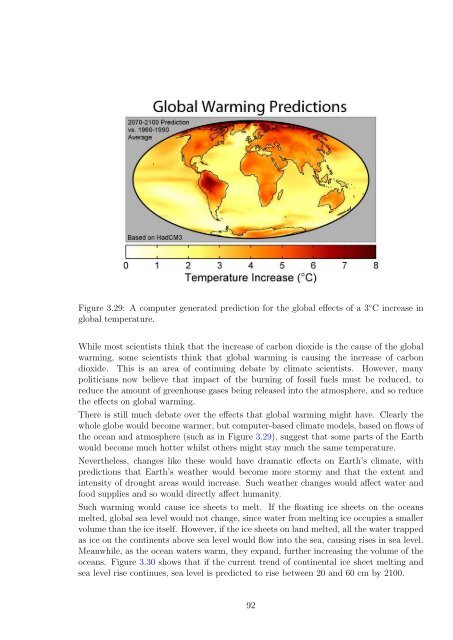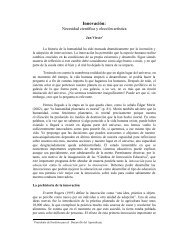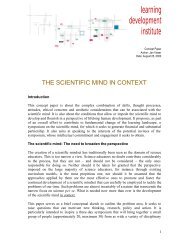The planet we live on: The beginnings of the Earth Sciences
The planet we live on: The beginnings of the Earth Sciences
The planet we live on: The beginnings of the Earth Sciences
- No tags were found...
Create successful ePaper yourself
Turn your PDF publications into a flip-book with our unique Google optimized e-Paper software.
Figure 3.29: A computer generated predicti<strong>on</strong> for <strong>the</strong> global effects <strong>of</strong> a 3 ◦ C increase inglobal temperature.While most scientists think that <strong>the</strong> increase <strong>of</strong> carb<strong>on</strong> dioxide is <strong>the</strong> cause <strong>of</strong> <strong>the</strong> globalwarming, some scientists think that global warming is causing <strong>the</strong> increase <strong>of</strong> carb<strong>on</strong>dioxide. This is an area <strong>of</strong> c<strong>on</strong>tinuing debate by climate scientists. Ho<str<strong>on</strong>g>we</str<strong>on</strong>g>ver, manypoliticians now believe that impact <strong>of</strong> <strong>the</strong> burning <strong>of</strong> fossil fuels must be reduced, toreduce <strong>the</strong> amount <strong>of</strong> greenhouse gases being released into <strong>the</strong> atmosphere, and so reduce<strong>the</strong> effects <strong>on</strong> global warming.<str<strong>on</strong>g>The</str<strong>on</strong>g>re is still much debate over <strong>the</strong> effects that global warming might have. Clearly <strong>the</strong>whole globe would become warmer, but computer-based climate models, based <strong>on</strong> flows <strong>of</strong><strong>the</strong> ocean and atmosphere (such as in Figure 3.29), suggest that some parts <strong>of</strong> <strong>the</strong> <strong>Earth</strong>would become much hotter whilst o<strong>the</strong>rs might stay much <strong>the</strong> same temperature.Never<strong>the</strong>less, changes like <strong>the</strong>se would have dramatic effects <strong>on</strong> <strong>Earth</strong>’s climate, withpredicti<strong>on</strong>s that <strong>Earth</strong>’s <str<strong>on</strong>g>we</str<strong>on</strong>g>a<strong>the</strong>r would become more stormy and that <strong>the</strong> extent andintensity <strong>of</strong> drought areas would increase. Such <str<strong>on</strong>g>we</str<strong>on</strong>g>a<strong>the</strong>r changes would affect water andfood supplies and so would directly affect humanity.Such warming would cause ice sheets to melt. If <strong>the</strong> floating ice sheets <strong>on</strong> <strong>the</strong> oceansmelted, global sea level would not change, since water from melting ice occupies a smallervolume than <strong>the</strong> ice itself. Ho<str<strong>on</strong>g>we</str<strong>on</strong>g>ver, if <strong>the</strong> ice sheets <strong>on</strong> land melted, all <strong>the</strong> water trappedas ice <strong>on</strong> <strong>the</strong> c<strong>on</strong>tinents above sea level would flow into <strong>the</strong> sea, causing rises in sea level.Meanwhile, as <strong>the</strong> ocean waters warm, <strong>the</strong>y expand, fur<strong>the</strong>r increasing <strong>the</strong> volume <strong>of</strong> <strong>the</strong>oceans. Figure 3.30 shows that if <strong>the</strong> current trend <strong>of</strong> c<strong>on</strong>tinental ice sheet melting andsea level rise c<strong>on</strong>tinues, sea level is predicted to rise bet<str<strong>on</strong>g>we</str<strong>on</strong>g>en 20 and 60 cm by 2100.92
















